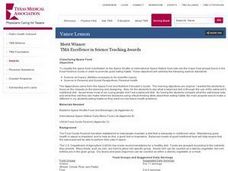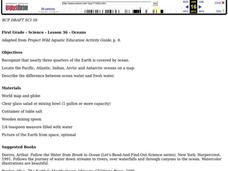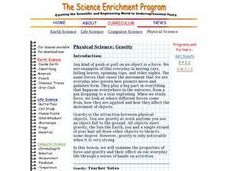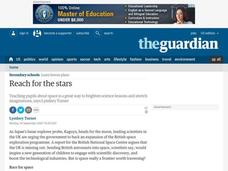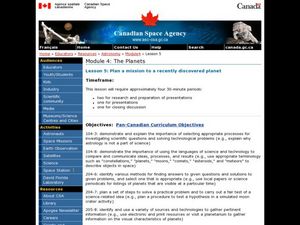Journey Through the Universe
Going through a Phase
Ignore the full moon, it's just a phase. Young scholars observe and record the moon during a full cycle before learning to predict future phases. Then the instructor leads a discussion on the other solar system objects that also go...
Curated OER
Unlocking the Endocrine System
Fifth graders use an analogy to the mail delivery system to study the workings of the human endocrine system. They discover the interrelationships between the human body systems while comparing them to engineering communicating with...
Curated OER
Designing and Constructing a Space Station
Students design a model station using a set of paper cutout. They determine the purposes for the parts of space stations before putting the parts together in an original set up. They role play as astronauts and Mission Control teams as...
Curated OER
What's Out There? Space Shuttle Exploration and Simulation
Students role-play the jobs of space shuttle astronauts, conduct experiments, and research space using the Internet and offline experiments. Student-astronauts hold a "press conference" to share their information with others in a...
Curated OER
Outerspace: Frontier for Personal Health and Hygiene
Students view photos of astronauts sleeping, eating, bathing, and using the toilet, and discuss hygiene problems in a zero-gravity environment. They contrast hygiene habits in space to those on Earth, and create storybooks illustrating...
Curated OER
Just Passing Through
Students examine the functions of the kidney and its place in the urinary system. They discuss how astronauts go the bathroom in space, examine labeled diagrams of the urinary system, and draw a large scale drawing of the excretory...
Curated OER
Our Amazing Skeleton
Pupils study the skeleton, about the number of and types of bones in the body, and how outer space affects astronauts' bones. They discover how to take care of their bones here on Earth to prevent osteoporosis, or, weakening of the...
Curated OER
Toy Story Statues
Students practice the skill of freezing and holding a still balance in different shapes.
Curated OER
Apollo Moon Landing
Students explore paper rockets, learn about the Apollo Program and Apollo spin-offs, and use simple office supplies to design and create a new useful product. This amazing plan is incredibly well written and leads students through a...
Curated OER
Classifying Space Food
Students write a written summary of what they have learned about the astronaut nutritional diet in comparison with their own diet habits.
Curated OER
Mission Meals
Young scholars engage in a investigation of the types of meals that astronauts eat in space while examining the types of nutritional elements needed for optimum physical tasks in space. They are given different foods and then document...
Curated OER
Rover Races
Students simulate driving a rover on the surface of Mars. For this space science lesson, students identify the challenges experienced by astronauts in operating a vehicle. They recommend some changes to make their 'rover' better.
Curated OER
The Stuff of Stories: Using Museums to Inspire Student Writing
Middle schoolers write descriptions, narratives, and dialogues based on objects of art and time periods in a museum. They base several writing assignments on art objects and paintings, including a literal description and an emotional...
Laboratory for Atmospheric and Space Physics
Space Travel Guide
Looking to take a trip? Why not go to space? Here, scholars take on the role as travel agent to create a guide to their favorite planet including travel tips and sightseeing recommendations.
University of Colorado
Space Travel Guide
Neptune takes 164.8 Earth years to travel around the sun. In the fifth of 22 lessons, young scientists create a travel guide to a planet in our solar system. They provide tips for others on what to bring, what they see, and their...
Curated OER
Oceans
First graders recognize that nearly three quarters of the Earth is covered by ocean. They locate the Pacific, Atlantic, Indian, Arctic and Antarctic oceans on a map. They describe the difference between ocean water and fresh water.
Curated OER
Physical Science: Gravity
Learners investigate the properties of force and gravity and their effects on everyday life. In groups, they test various balls by bouncing them on different surfaces and observe the properties. In another activity, they test marbles and...
Curated OER
What are Stars?
Young scholars research the solar system and it's characteristics. For this solar system lesson, students are broken into 4 groups, each assigned a specific part of the solar system. Young scholars use the Internet to research their...
Curated OER
Reach for the Stars
Students consider the significance of space exploration. In this space science lesson, students visit selected websites to discover information about astronomy, lunar missions, and space travel. Students discuss the value of space...
Curated OER
Weightlessness
Students use a coffee cup to demonstrate weightlessness. After a lecture/demo, students read an article on free-fall. They perform a simple experiment which helps them explain the concept of weightlessness.
Curated OER
Plan a Mission to Recently Discovered Planet
Young scholars plan a mission to a recently discovered planet. In this science lesson plan, students research spacecraft design, distances in space, long-term missions in space, and life-sustaining planets. Young scholars work in groups...
Curated OER
Space Travel Timeline
Students use the Internet to find events in space history to include in a timeline. They recognize the cause and effect relationships between events that happened in the exploration of space. They see how to use the TimeLiner software.
Curated OER
Space
First graders examine space in this unit of lessons. They create a KWL chart and write in their journals about space. They also examine the phases of the moon and identify the constellations.
Curated OER
The Adventures of Visualization
Fourth graders pretend they are going on a trip to Mars as they close their eyes and visualize the journey. They discuss what they saw on the journey to determine how one student may visualize something different than another. Next, they...











